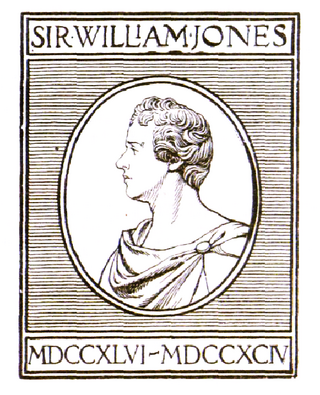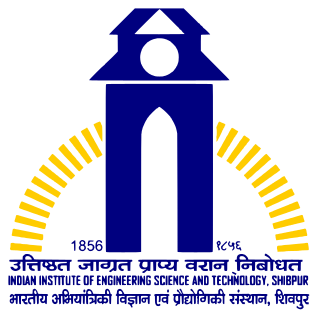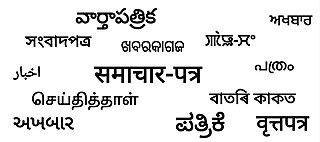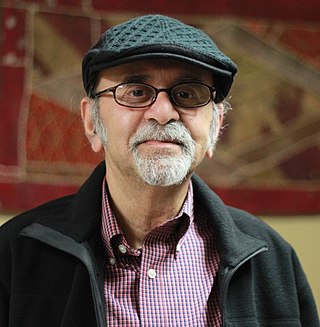Mass media in India consists of several different means of communication: television, radio, cinema, newspapers, magazines, and Internet-based websites/portals. Indian media was active since the late 18th century. The print media started in India as early as 1780. Radio broadcasting began in 1927. Today much of the media is controlled by large, corporations, which reap revenue from advertising, subscriptions, and sale of copyrighted material.

William Benedict Hamilton-Dalrymple is an India-based Scottish historian and art historian, as well as a curator, broadcaster and critic. He is also one of the co-founders and co-directors of the world's largest writers' festival, the annual Jaipur Literature Festival. He is currently a Visiting Fellow at All Souls College, Oxford.

Hicky's Bengal Gazette or the Original Calcutta General Advertiser was an English-language weekly newspaper published in Kolkata, the capital of British India. It was the first newspaper printed in Asia, and was published for two years, between 1780 and 1782, before the East India Company seized the newspaper's types and printing press. Founded by James Augustus Hicky, a highly eccentric Irishman who had previously spent two years in jail for debt, the newspaper was a strong critic of the administration of Governor General Warren Hastings. The newspaper was important for its provocative journalism and its fight for free expression in India.

The Asiatic Society is a Government of India organisation founded during the Company rule in India to enhance and further the cause of "Oriental research". It was founded by the philologist William Jones on 15 January 1784 in a meeting presided over by Justice Robert Chambers in Calcutta, the then-capital of the Presidency of Fort William.

Indian Institute of Engineering Science and Technology, Shibpur is a public technological university located at Shibpur, Howrah, West Bengal, India. Founded in 1856, it is recognised as an Institute of National Importance under Ministry of Education by the Government of India. It is controlled by the Council of NITSER. It is the fourth oldest engineering institute in India

The Bengal Renaissance, also known as the Bengali Renaissance, was a cultural, social, intellectual, and artistic movement that took place in the Bengal region of the British Raj, from the late 18th century to the early 20th century. Historians have traced the beginnings of the movement to the victory of the British East India Company at the 1757 Battle of Plassey, as well as the works of reformer Raja Rammohan Roy, considered the "Father of the Bengal Renaissance," born in 1772. Nitish Sengupta stated that the movement "can be said to have … ended with Rabindranath Tagore," Asia's first Nobel laureate.
Claims of media bias in South Asia attract constant attention. The question of bias in South Asian media is also of great interest to people living outside of South Asia. Some accusations of media bias are motivated by a disinterested desire for truth, some are politically motivated. Media bias occurs in television, newspapers, school books and other media.
The Grantville Gazettes were a series of anthologies of short stories set in the 1632 universe introduced in Eric Flint's novel 1632 that was published as a bi-monthly electronic magazine from 2003 until shortly after Flint's death in 2022.

Hindi media refers to media in Hindi language and its dialects, across the Hindi belt in India, and elsewhere with the Hindi-speaking Indian diaspora.
In British India, the Vernacular Press Act (1878) was enacted to curtail the freedom of the Indian press and prevent the expression of criticism toward British policies—notably, the opposition that had grown with the outset of the Second Anglo-Afghan War (1878–80). The government adopted the Vernacular Press Act 1878 to regulate the indigenous press in order to manage strong public opinion and seditious writing producing unhappiness among the people of native region with the government. The Act was proposed by Lytton, then Viceroy of India, and was unanimously passed by the Viceroy's Council on 14 March 1878. The act excluded English-language publications as it was meant to control seditious writing in 'publications in Oriental languages' everywhere in the country, except for the South. Thus the British totally discriminated against the Indian Press.
In the last quarter of the 18th century, Calcutta grew into the first major centre of commercial and government printing. For the first time in the context of South Asia it becomes possible to talk of a nascent book trade which was full-fledged and included the operations of printers, binders, subscription publishing and libraries.
James Augustus Hicky was an Irishman who launched the first printed newspaper in India, Hicky's Bengal Gazette.
Parameswaran Thankappan Nair was an Indian writer, independent researcher, historian and Malayali author based in Kolkata, who wrote extensively on the history of Calcutta in the English language. Fondly referred to as the "Barefoot Historian", he published 61 books, with the latest titled "Gandhiji in Kolkata".

Subrata Dasgupta is a bi-cultural multidisciplinary scholar, scientist, and writer. Born in Calcutta, he was educated in England, India, and Canada.
The Calcutta Chronicle and General Advertiser was a weekly English-language newspaper published in Kolkata, the capital of British India. It was one of the earliest newspapers in colonial India and was published for four years until it stopped its publication under pressure from the East India Company. Two Englishmen, Daniel Stuart and Joseph Cooper, founded the newspaper and also set up the Chronicle Printing Press. A large portion of the newspaper was dedicated to advertisements, and therefore was also called the 'General Advertiser'.

The India Gazette; or, Calcutta Public Advertiser was an English language weekly newspaper published in Calcutta, then capital of British India. It was the second newspaper printed in India.

Freedom of the press in British India or freedom of the press in pre-independence India refers to the censorship on print media during the period of British rule by the British Crown on the Indian subcontinent from 1858 to 1947. The British Indian press was legally protected by the set of laws such as Vernacular Press Act, Censorship of Press Act, 1799, Metcalfe Act and Indian Press Act, 1910, while the media outlets were regulated by the Licensing Regulations, 1823, Licensing Act, 1857 and Registration Act, 1867. The British administrators in the India subcontinent brought a set of rules and regulations into effect designed to prevent circulating claimed inaccurate, media bias and disinformation across the subcontinent.

Sanjay Dutt: The Crazy Untold Story of Bollywood's Bad Boy is a biography by Yasser Usman, detailing the life and career of the Indian film actor Sanjay Dutt. It chronicles his birth to actors Sunil Dutt and Nargis, his relationship with the actress Madhuri Dixit, covered extensively in the media at the time, being jailed because of his involvement in the Bombay riots, and his 47-year film career. The book was released on 13 March 2018 by Juggernaut Books and praised by critics.

Yasser Usman is an Indian television journalist, bestselling author, news presenter, and biographer. Born in Delhi, Yasser Usman began his career by working as a television presenter and was awarded the prestigious Ramnath Goenka Excellence in Journalism Award for his contribution. Usman has been recognised by the media as one of India's most successful film biographers.









